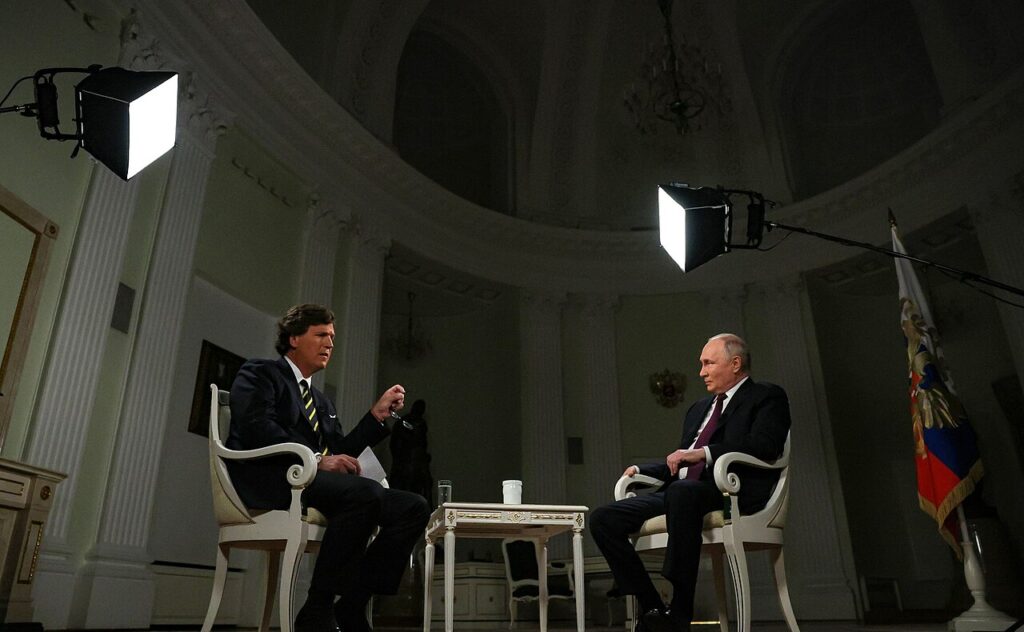Matt Kroenig: Hi, Emma! I usually like turning to you for insights on President Vladimir Putin and Russia, but your insights may be dated. Unlike Tucker Carlson, you haven’t spent hours chatting with the dictator lately.
Emma Ashford: Having seen most of that interview, I’m mostly grateful for the fast-forward button. He usually doesn’t let his guests talk much, but I guess he was intimidated by Putin this time. Tucker spent hours being lectured about medieval Russian history and other irrelevant issues. Putin came across as a smug, spoiled leader who never gets told that he’s wrong by anyone.
But the fact that Carlson went to Moscow to do that interview—and the fact that the Kremlin was willing to grant it—says a lot about the state of the Ukraine debate in America at this point: growing disenchantment among grassroots Republicans and growing partisan rancor on the question of future funding.
Did you glean any insights from Putin’s pontificating?
MK: Well, you are right that the debate on Ukraine strategy is at an inflection point, and I think that would be a good topic for the rest of the column.
But starting on the Carlson interview, I had several takeaways. First, I thought it was genuinely enlightening to hear Putin’s view of the world. Even if you disagree, it provided a window into his mindset. He seemed to genuinely believe, for example, that he was right to detain Wall Street Journal reporter Evan Gershkovich, because his investigative reporting turned up information that Putin considered classified.
Second, I found it humorous, but also a bit uncomfortable, as Putin occasionally insulted someone who was trying to do his reputation such a huge favor. Did you catch the bit when he said it is understandable that Carlson wasn’t accepted into the CIA as a young man because it is a “serious organization”?
Third, and most importantly, it further revealed that Putin’s reason for invading Ukraine wasn’t about recent history, mistakes America made, etc., but about ancient (or at least medieval) history. Putin is intent on resurrecting the Russian Empire, and the West is right, in my view, to defend the more civilized European order in place today. (I enjoyed the tweet from the former Mongolian president, joking that if current borders should be based on medieval maps, then Ulaanbaatar has some boundaries it would like to adjust.)
Your thoughts?
EA: We’re absolutely not getting into a discussion of which people lived where in ancient times. You promised me we wouldn’t have to talk about the Middle East for at least one column! But I would like to place my ancient Scottish claim to most of Roman Britain. I hear Cumbria is nice in the spring.
The interview was certainly worth watching. And it’s always amusing to watch Carlson getting mocked. But in all seriousness, Putin did himself no favors here. It’s a sign of how out of touch he and his regime are that he took an ideal opportunity to reach out to disaffected GOP voters in the United States and convince them that support for Ukraine is a waste and instead turned it into a restatement of all of his pet peeves and historical minutiae.
This continues a general trend with Russia in recent years: Its election interference and meddling in Western societies would probably be more effective if it actually bothered to learn more. I’ll give you an example: The Russians have been trying to boost the “Texit” campaign, a few crazy people who want Texas to secede from the United States. I’m pretty sure that’s not going to work. We can at least count ourselves lucky that they’re just really bad at understanding how to appeal to Americans.
It’s also more evidence that the disaffection about Ukraine aid in the United States really isn’t a Russian plot, as some pundits are starting to claim. It’s about broad-based unhappiness about the amount of money that’s being sent over there, the question of why European states aren’t contributing more, and why the Biden administration appears to have no endgame for resolving the conflict.
These are all objections that were raised by Senate Republicans during the debate on the supplemental Ukraine aid bill, and former U.S. President Donald Trump has started calling for aid to be provided only if it is a loan to be paid back.
Read the full article on Foreign Policy




